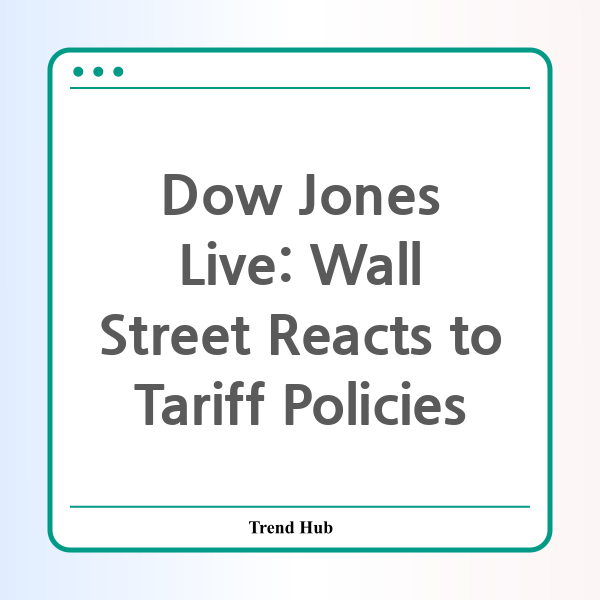* This website participates in the Amazon Affiliate Program and earns from qualifying purchases.

Is Wall Street's Anger Justified? Unpacking the Tariff Fallout
As the stock market gears up for a new trading day, all eyes are on the Dow Jones Industrial Average (DJIA) as it navigates a turbulent landscape shaped by aggressive tariff decisions. With fluctuations in stock prices and investor sentiment swinging wildly, understanding the implications of these policies is crucial for anyone looking to make sense of their investments in this climate.
Record Fluctuations Amid Tariff Turbulence
On Monday, the DJIA recorded its largest intraday swing ever, a staggering 2,595 points from low to high, before ultimately ending the day 349 points lower. This extraordinary volatility has left many investors uneasy, as uncertainty looms over how President Trump’s tariffs will impact the economy. Investors are particularly concerned about potential repercussions not just on stocks but on consumer prices and economic growth.
Investor Sentiment: Tariff Stupidity?
The term "stupidity" comes up frequently in discussions among Wall Street analysts and investors. The frustration is palpable; many feel that the decisions being made are shortsighted and could lead the economy towards a tipping point. As tariffs on imports potentially inflate consumer goods prices, the worry among economists continues to mount regarding the likelihood of a recession.
Key Points Investors Should Consider
- 1. Historical Market Swing: The DJIA's largest recorded intraday swing is a sign of high volatility, making it essential for investors to stay informed about market movements.
- 2. Tariff Negotiations on the Horizon: Treasury Secretary Scott Bessent has hinted at the potential for negotiations with around 50 countries. The efficacy and outcomes of these discussions remain a crucial factor for market stability.
- 3. CEO Reactions: The Recession Talk: A substantial 69% of CEOs surveyed believe a recession may be imminent. BlackRock’s CEO pointed out that sentiment among business leaders is concerning, illustrated by the declining health of the airline industry.
- 4. Apple Inc. Under Pressure: Apple's market cap has plummeted by $638 billion within just three trading days, as tariffs threaten its supply chain largely concentrated in China. Analysts suggest that the tech giant might raise prices to counterbalance tariff impacts.
- 5. Consumer Behavior Shifts: Retail giants like Walmart are reporting strong growth in their membership services. As consumers seek more convenience and lower prices, the health and strategy of these companies will be critical in navigating trade challenges.
Looking Ahead: What’s Next for the Dow Jones?
The situation remains dynamic, with stock futures showing early signs of recovery. However, investors should tread cautiously and remain informed about ongoing developments, particularly regarding tariff negotiations with foreign nations and their potential consequences. As discussions unfold, the fate of the Dow Jones and broader market is intricately tied to these economic policies.
In conclusion, the phrase "tariff stupidity" may well reflect the frustration of many on Wall Street, but it also encapsulates the uncertainty of the current market environment. Staying updated and engaged with market trends is crucial for any investor hoping to navigate through these challenging times effectively.
* This website participates in the Amazon Affiliate Program and earns from qualifying purchases.